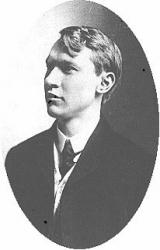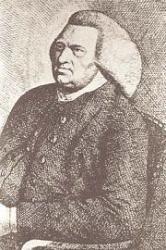Planning worship?
Check out our sister site, ZeteoSearch.org,
for 20+ additional resources related to your search.
- |
User Links
Person Results
William H. Callcott
1807 - 1882 Composer of "ELIM" in The Hymnal CALLCOTT, WILLIAM HUTCHINS (1807–1882), musical composer, a younger son of Dr. John Wall Callcott [q. v.], was born at Kensington in 1807. As a child he received some instruction from his father, and later continued his studies under his brother-in-law, William Horsley. On 4 July 1830 he was elected a member of the Royal Society of Musicians. In 1836 he published an abridgment of his father's ‘Grammar,’ in 1840 a collection of psalm and hymn tunes for Bickersteth's ‘Christian Psalmody,’ and in 1843 ‘The Child's own Singing Book.’ In the latter work he was assisted by his wife Maria, who was the authoress of several unimportant religious stories, &c. In 1851 Callcott published ‘Remarks on the Royal Albert Piano’ (exhibited at the International Exhibition), and in 1859 ‘A few Facts on the Life of Handel.’ Callcott was for some years organist of Ely Place Chapel. In the latter part of his life he suffered much from ill-health. He died at 1 Campden House Road, Kensington, on 5 Aug. 1882, and was buried on the 9th at Kensal Green. Callcott composed several songs, glees, and anthems, but his name is principally known by his arrangements and transcriptions for the piano, which amount to many hundred pieces. A son of his, Robert Stuart Callcott, who showed great promise as an organist and musician, died in the spring of 1886 at an early age.
--en.wikisource.org/wiki/
William H. Callcott
Powell G. Fithian
b. 1861 Person Name: P. G. Fithian Composer of "[The past we never can undo]" in Joyful Sound Born: April 30, 1861, Greenwich Township (now Gibbstown), New Jersey.
Fithian was music director for the public schools in Camden, New Jersey. He and his wife Julia were both listed in the 1910 and 1920 census, but his wife appears alone in the 1930 census. Powell’s works include:
Songs of the Mercy Seat, with George Hugg (Methodist Episcopal Book Room, 1899)
Songs for Work and Worship, with Howard Entwisle & Adam Geibel (Dayton, Ohio: Lorenz & Company, 1900)
Exalted Praise, with Howard Entwisle (Philadelphia, Pennsylvania: MacCalla & Company, 1901)
Heavenly Sunlight, with Howard Entwisle & Adam Geibel (Philadelphia, Pennsylvania: MacCalla & Company, 1902)
The Fithian Music Primer (New York: American Book Company, 1915)
--www.hymntime.com/tch/
Powell G. Fithian
Richard L. VanOss
b. 1953 Person Name: Richard L. Van Oss Composer of "MAPLE AVENUE" in Singing the New Testament
Richard L. VanOss
Frederick Christian Mayer
1882 - 1973 Person Name: Frederick C. Mayer Composer of "MAYER" in American Lutheran Hymnal
Frederick Christian Mayer
B. I. Cline
1910 - 2006 Person Name: B. I. C. Author of "I Want to See My Jesus" in Matchless Gift Born: December 8, 1910, Elkhurst, West Virginia.
Died: November 12, 2006, Charleston, West Virginia.
Buried: Tyler Mountain Memory Gardens, Cross Lanes, West Virginia.
Cline’s works include:
Camp Meeting Songs, 1958
--www.hymntime.com/tch/
B. I. Cline
Thomas MacKellar

1812 - 1899 Person Name: Thomas Mackellar Author of "Waiting at the Door" in The Helper in Sacred Song Mackellar, Thomas, was born in New York, Aug. 12, 1812. At the age of 14 he entered the printing establishment of Harper Brothers. In 1833 he removed to Philadelphia and joined the type-foundry firm of Johnson & Smith, as proof reader. He subsequently became a foreman, and then a partner in that firm, which has been known from 1860 as Mackellar, Smiths, and Jordan, type-founders of Philadelphia. His publications include The American Printer, 1866, a prose work, and the following in verse:—
(1) Droppings from the Heart, 1844; (2) Tam's Fortnight Ramble, 1847; (3) Lines for the Gentle and Loving, 1853; (4) Rhymes Atween Times, 1872. The last contains some of his hymns. (5) Hymns and a few Metrical Psalms, Phila. 1883 (71 hymns, 3 psalms), 2nd edition, 1887 (84 hymns, 3 psalms).
Those of his hymns in common use include :—
1. At the door of mercy sighing. Lent. Published in his Rhymes Atween Times, 1872, as, "Long of restful peace forsaken," and again in Dr. Hitchcock's Hymns & Songs of Praise, 1874, as "At the door of mercy sighing."
2. Bear the burden of the present. Resignation. Written in 1852, and published in his Lines for the Gentle and Loving, 1853; and Lyra Sacra Americana, 1868. Part of this hymn, beginning "All unseen the Master walketh," was in common use in Great Britain.
3. Book of grace, and book of glory. Holy Scripture. Written in 1843. It was given in the Sunday School Union Collection, 1860, and his Hymns and a few M. Psalms, &c, 1883, and a few collections, including Allon's Children's Worship, 1878, &c.
4. Draw nigh to the Holy. Jesus, the soul’s Refuge. In Sumner's Songs of Zion, 1851, and the Lyra Sacra Americana, 1868, in 5 st. of 8 1ines.
5. Father, in my life's young morning. A Child's Prayer. Written in 1841.
6. In the vineyard of our Father. Work for God. Written in 1845. It was given in the Hymns for Church & Home, Philadelphia, I860, and other collections.
7. Jesus! when my soul is parting. Continued presence of Jesus desired. Written in 1848, and included in Lyra Sacra Americana, 1868, in 4 stanzas of 6 lines, and entitled "Jesus first and last."
8. There is a land immortal. Heaven. Mr. Mackellar says that this hymn was written
"One evening as a fancy suddenly struck me of a religious nature, I laid aside the work in hand, and pursuing the new idea, I at once produced the hymn, ‘There is a land immortal,' and sent it to the editor [of Neale's Gazette], who referred to it as a religious poem from ‘Tam,' my assumed name, under which I had already acquired considerable notoriety. This was in 1845. It was widely copied, and afterwards inserted in a volume published by me." Duffield's English Hymns, &c, 1886, p. 551.
Mr. Mackellar was an Elder of the Presbyterian Church. [Rev. F. M. Bird, M.A.]
-- John Julian, Dictionary of Hymnology (1907)
======================
Mackellar, T., p. 708, ii. Additional hymns are:— (1) "I have no hiding-place" (Safety in Jesus), (2) “I will extol Thee every day" (Praise to God). These are dated 1880 and 1871 respectively in Stryker's Church Songs, N. Y., 1889. He died Dec. 29, 1899.
--John Julian, Dictionary of Hymnology, Appendix, Part II (1907)
============
Mackellar, T., pp. 708, ii.; 1578, ii. He died Dec. 29, 1899. His hymn, “O the darkness, O the sorrow" (Redemption through Christ), was written in 1886, and added to the latest 1668 editions of his Hymns & Metrical Psalms. It is found in Summa Corda, 1898, and several other collections. His Hymns and Poems were collected and published in 1900. [Rev. L. F. Benson, D.D.]
--John Julian, Dictionary of Hymnology, New Supplement (1907)
Thomas MacKellar
P. C. Kirkegaard
Author of "O Jesus Dear! O Savior Mild!" in Hymnal for Church and Home
P. C. Kirkegaard
Vachel Lindsay

1879 - 1931 Author of "An Endless Line of Splendor" in The Cyber Hymnal Lindsay, Vachel. (Springfield, Illinois, November 10, 1879--December 4, 1931, Springfield, Ill.). This noted American poet was an enthusiastic supporter of the Disciple movement (see, for example, his poem "Alexander Campbell"), and one of his short pieces, "Foreign Missions in Battle Array," was used as a hymn in Christian Worship (1941), having appeared earlier in the nondenominational Christian Worship and Praise (1939). It begins:
An endless line of splendor,
These troops with heaven for home,
With creeds they go from Scotland,
With incense go from Rome.
--George Brandon, DNAH Archives
Also:
Lintsey, Veitsel
Lindsay, Nicholas Vachel
Vachel Lindsay
James Relly

1722 - 1778 Author of "Behold the King of Kings" in Psalms, Hymns and Spiritual Songs James Relly was born about 1722 at Jeffreston, Pembrokeshire, Wales, and died in 1778. He was converted to Christianity during the Great Awakening ushered in by George Whitefield. He worked under George Whitefield as a Calvinistic Methodist preacher and missionary. However, Whitefield and Relly separated ways over Relly's seemingly universalist teaching that all humanity was elect (i.e. saved) when Christ took the punishment for all sin when he died. He also departed from both the Calvinists and Methodists by taking the doctrine of Justification further, in teaching that believers no longer sin and the Law's sole purpose is to condemn humanity and point them to Christ.
He was the mentor of John Murray, the founder of the Universalist Church of America. Relly along with his brother John wrote Christian Hymns, Poems and Spiritual Songs in 1758, which John Murray had republished in America in 1776.
Dianne Shapiro; from an article by Alexander Gordon in Dictionary of National Biography, 1885-1900, vol. 48; Dictionary of Unitarian and Universalist Biography; and Disoriented. Reoriented. blog (https://disorientedtheology.wordpress.com/2013/08/29/all-shall-be-well-chapter-6-james-relly/)
James Relly


 My Starred Hymns
My Starred Hymns


